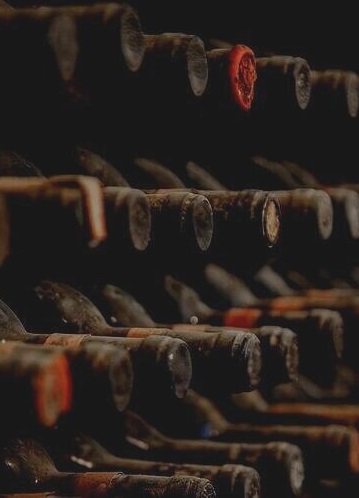
Dear reader,
Breno is back with tips to make your experience with fine wines and investing in wine even better.
In earlier articles, I’ve given you tips about issues widely ranging from the ideal temperatures to serve your different wines to a food and wine pairing 101 to the best glass for each wine style to when to aerate/decant a wine and even to what you must know to invest in fine wine.
Now here’s a special something for you: some essential tips on how to properly store your wines at home for the long term.
I know. Building a wine cellar to keep your finest age-worthy wines, such as the ones we offer on our exchange, is an almost impossible task unless you have space and the conditions to maintain your bottles under cool temperature, steady humidity and all surrounding things.
That’s also why most of our proud fine wine investors have been opting to maintain the bottles they purchase on our platform and marketplace bonded in our partner Bordeaux City Bond, where the best conditions are ensured for fine wines to age under the perfect conditions and reach their full expression in the long term (read our FAQ to know more).
Without further ado, let me give you a few crucial tips to store your wines at home at the best possible conditions, mirroring the closest to a cellar you can reach under different environments.
Cool, stable temperature

Pay maximum attention against the heat, as wine develops and ages much more quickly in upper temperatures. Especially if you are in the summer or in a warmer country, this could mean disastrous “cooking” of your wine.
The optimum temperature for long term aging is usually considered around 12°-13°C, even though pretty much anything between around 8°C to 18°C will likely preserve your wine and let it develop its flavors and aromas without risks – while above 20°-21°C, wines start aging fast.
Most importantly, keep your bottles at a stable storage temperature. Quick fluctuations can also make corks expand and contract, ruining your wine as seen above. No worries if your storage is natural and has mild variations throughout the day or on different seasons: just avoid big temperature swings and shocks.
Oh: see also the perfect temperature to serve your wine.
Lie them down
Thinking forward, store your wine horizontally – in a wine rack or anything that maintains its stability against excessive vibrations.
While this keeps the cork moist, avoiding the premature aging, it also helps avoiding aggressive “shake-ups” that can unchain chemical reactions and damage a wine in the long term.
Good humidity
The ideal humidity to keep your wines should be between 60% and 80%. You may wonder why is that, after all wines are bottled and sealed.
That’s because low humidity means your cork can dry out starting from outer edge, leaving the wine vulnerable to oxygen. Meanwhile, excessive humidity can damage the label – if you plan on selling your age-worthy wine later on, that’s a big problem. If not, go ahead.
Dark is good
No, I’m not referring to that Netflix show everyone keeps talking about.
Too much light can deeply affect wines in the long term, due to the chemical reactions it provokes. That’s why most red wines are bottled with darker, greenish glass.
Since whites are not usually aged for long, their bottles are clear or lighter colored.
One way or another, keep your stored wines in a place with dim light.
function runOnFormSubmit_sf233d4b31ff5412175d1dfdf1e4747a3a3d2af3e628508ae6(th){
/*Before submit, if you want to trigger your event, “include your code here”*/
};

| Thank you for Signing Up |
REPORT
1,true,6,Contact Email,2
1,false,1,First Name,2
1,false,1,Last Name,2


“What could it be?”
If you are very lucky, a dim-lit basement that is cold, humid and not often accessed is the perfect option. With some modifications, you can set up a professional regulation to turn it in fact into a cellar.
But we know it’s extremely hard, so it might be the case of “improvising”.
“Can I go for the refrigerator?”
A common refrigerator (not to mention freezers…) is dry and falls below the minimum optimal storage temperature. This could eventually be problematic for longer storage periods – because it might contract and dry out the cork, allowing more air to come in contact with the wine and severely damaging it.
I know: it’s quite hard to have a constantly cool, dark place that is away from the light and excessive vibrations to have as a cellar. Then why not invest in a wine cooler?
Albeit in a small scale, such coolers are designed to maintain a consistent temperature – even in terms of serving, already –, humidity and luminosity, holding your wines in optimal conditions for long-term aging.
Some fancier ones have colder temperature spots if you plan on storing reds and whites and even Champagne there, making the serving life easier. Be also sure to check for coolers that have solid temperature and humidity regulation.


So many options out there. Check ones that suit what you have, are silent and are easy to regulate.
For the long term, remember:
it’s just the case of few wines.
We know home wine cellars are a charm, but don’t forget that around mere 5% of the wines produced in the world are meant to grow in quality as they age. That is the case of the fine and rare wines we monthly offer at Alti Wine Exchange.
Meaning: no need for cellaring the utmost majority of the wines you have. As the Wine Cellar Insider points out, most wines are in fact at their peak the day they are released in the market.
So: no use in keeping a wine that’s not age-worthy at home for years and years. If a wine is not meant to develop its finest qualities as time passes, drink it rather sooner than later.
***
Until next time, and keep exploring!
